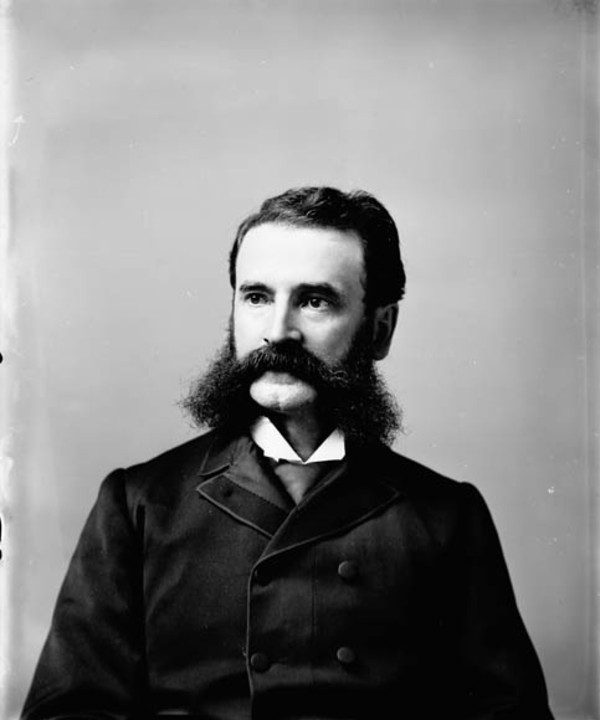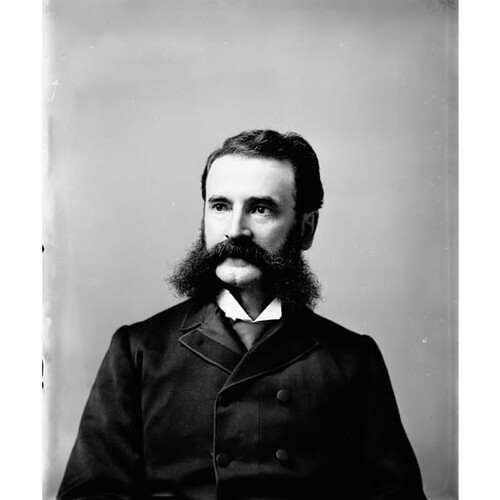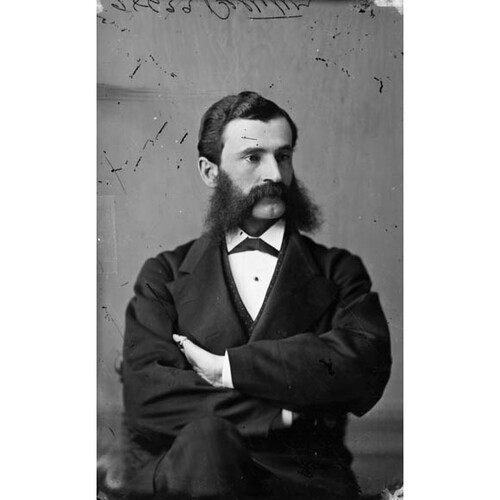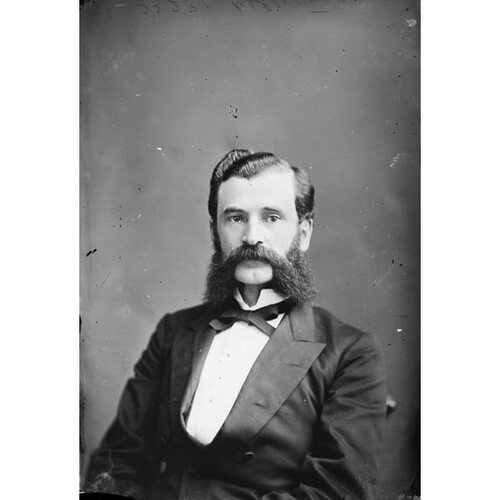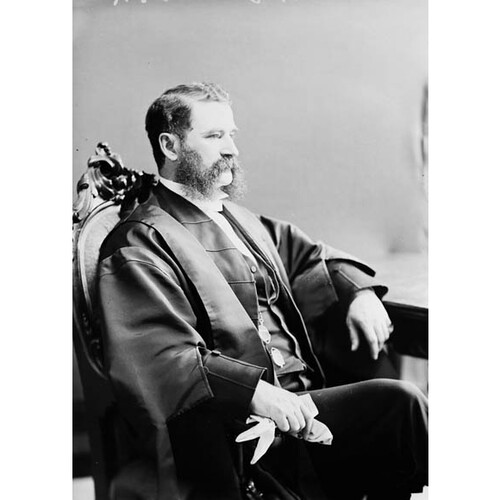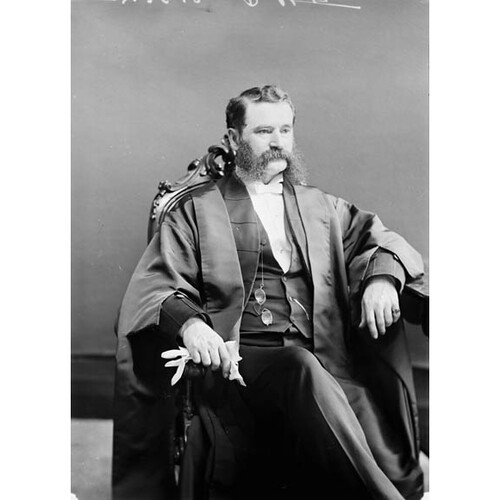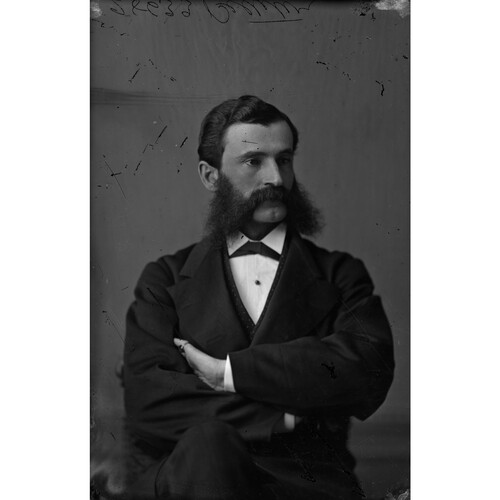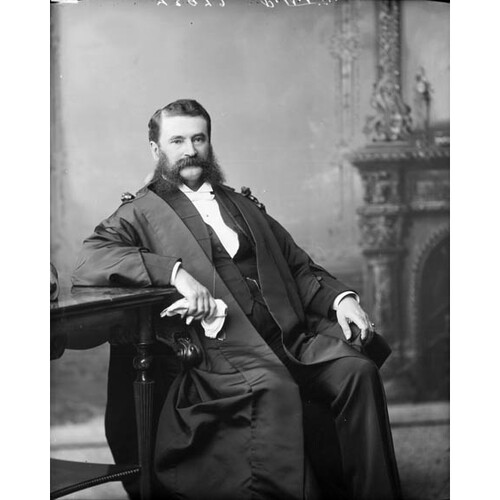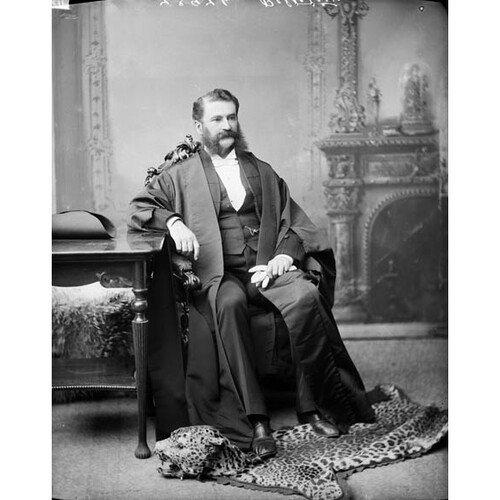PELLETIER, Sir CHARLES-ALPHONSE-PANTALÉON (baptized Charles-Pantaléon), lawyer, militia officer, politician, publisher, office holder, and judge; b. 22 Jan. 1837 in Rivière-Ouelle, Lower Canada, son of Jean-Marie Pelletier, a farmer, and Julie Painchaud, the sister of Abbé Charles-François Painchaud*; d. 29 April 1911 in Sillery, Que., and was buried 4 May in the Rivière-Ouelle cemetery.
Charles-Alphonse-Pantaléon Pelletier did the classical program at the Collège de Sainte-Anne-de-la-Pocatière from 1845 to 1856, and then studied law for three years at the Université Laval in Quebec City. He was called to the bar of Lower Canada on 2 Jan. 1860 and he practised at Quebec with Louis de Gonzague Baillairgé*. His marriage to Susanne Casgrain, daughter of Charles-Eusèbe Casgrain* and Eliza Anne Baby, in Rivière-Ouelle on 23 July 1861 connected him with two influential families, several of whose members had held political office. The untimely death of his wife in 1862 while giving birth to a son, Oscar-Charles-Casgrain (who would have an illustrious military career), did not end his friendship with his brother-in-law, Philippe-Baby Casgrain. He may have owed his rapid rise in the militia to his in-laws. On active service with the Voltigeurs de Québec by 1862, he was promoted captain in 1863. He received a first-class certificate from the School of Military Instruction of Quebec on 18 April 1864 and in 1865 he was in command of No.1 Company, 9th Battalion Volunteer Militia Rifles (formerly the Voltigeurs). In 1866, at the time of the Fenian raids, he became battalion adjutant with the rank of major. Second in command from 1866 to 1867, he retired in the latter year. On 12 Feb. 1866, at Les Éboulements, Pelletier had married a descendant of another distinguished family, Eugénie de Sales Laterrière, the daughter of Marc-Pascal de Sales* Laterrière, a physician, and Eulalie-Antoinette Denéchaud. They had only one child, who died in infancy.
In the elections of 1867, which were held for both the Legislative Assembly and the House of Commons, Pelletier chose to enter the provincial arena. He was attracted first by the Conservative party, which was strong in his native county of Kamouraska. There seemed to be little difference between him and the Conservative Jean-Charles Chapais*, whom he decided to run against, but his opponent claimed that he was “only the agent in disguise” of Liberal Luc Letellier* de Saint-Just. Following scenes of violence that prevented the calling of the voters’ roll, the election was annulled at both the provincial and the federal level, and the constituency of Kamouraska remained unrepresented until 1869. At a by-election on 17 February that year Pelletier won a seat in the House of Commons as a Liberal. His opponent on this occasion, and in 1872 when he was again returned, was Adolphe-Basile Routhier.
Pelletier did not quit the provincial scene, however. He was president of the Société Saint-Jean-Baptiste de la Cité de Québec from 1871 to 1873, and in 1872 he joined a group of moderate Liberals who, with Honoré Mercier* as secretary, founded a movement that became the Parti National. He was that party’s candidate in Quebec East in the by-election of 3 and 4 March 1873. There was a stormy campaign: his bullet-pierced top hat became a legend. He won the seat in the Legislative Assembly but held it for only a short time; he resigned on 20 Jan. 1874, when the double mandate was abolished. He retained the federal riding of Kamouraska, where he was reelected by acclamation that year, but he maintained an interest in Quebec East, the constituency that Wilfrid Laurier took in a federal by-election in 1877. Pelletier acted as his representative and received his constituents. Requests for patronage in the Quebec district went through his hands and he himself often looked into the merits and qualifications of applicants.
In December 1876 Letellier de Saint-Just had become lieutenant governor of Quebec. To ensure continued regional representation, Prime Minister Alexander Mackenzie* chose Pelletier to replace him as minister of agriculture, even though Pelletier was not the unanimous choice of the Quebec Liberal caucus, some of whose members accused him of using patronage mainly to further his own interests. Named to the Privy Council on 26 Jan. 1877, Pelletier resigned from the house on 2 February to become senator for the division of Grandville. Minister of agriculture until 16 Oct. 1878, he was also president of the Canadian commission for the universal exposition in Paris in 1878. Although ministerial responsibilities prevented him from going to Paris, his place on the commission earned him appointment on 30 October as a companion of the Order of St Michael and St George, of which he became a knight commander on 21 May 1898. He did not hold the agriculture portfolio for long, since the Conservatives had won the election of September 1878, but he served as a senator until 1896.
The city of Quebec remained the scene of Pelletier’s principal activities. He had been practising law in partnership with Mathias Chouinard since 1877, was made a qc on 20 Jan. 1879, and acted as crown counsel for the provincial government in the course of that year. From 1885 he served as assistant to his former partner Baillairgé, who had been counsel for the city of Quebec since 1861. Pelletier carried out the duties of counsel alone from 1896 to 1900, when he was given an assistant in the person of Chouinard (who would replace him on his appointment to the bench in 1904). He was bâtonnier of the Quebec bar in 1892.
Still active in the Liberal party, Pelletier helped found the Liberal newspaper L’Électeur in 1880 [see Ernest Pacaud*]. In fact, it was he who suggested the paper’s name. He served on its first board and, although his role at the newspaper was unobtrusive (his name was seldom mentioned in articles), it was nevertheless very important. Pelletier assisted the paper financially on several occasions. Years later he would become its managing editor. In this capacity he negotiated with the typographers’ union in January 1903 and prevented a strike. His efforts were not appreciated by Pacaud, the editor, who urged him to concentrate on getting federal government contracts. As managing editor, he signed the bill of sale of Le Soleil (as L’Électeur had been renamed in 1896) in the fall of 1903 when Pacaud quit as editor. Pelletier spent his afternoons at the newspaper and, although he denied being in charge, he was president of the new publishing company and the “managing head.” He certainly appears to have written articles or had a hand in editing them, but his chief role was to act as censor. “We often receive articles that it would be better for us not to print,” he noted in 1904. “I have already killed some, but I am not always there.”
A businessman in a small way, Pelletier was vice-president of the Quebec Fire Assurance Company and of the Quebec and Lake Huron Railway Company. He was also a director of the Quebec and Charlevoix Navigation Company, and of the Compagnie de Colonisation de Rivière-Ouelle, to which he had sold a large tract of his land for $7,500 in 1882.
Since the Liberal party had the same organization provincially as federally, Pelletier was involved in helping the province’s political leaders. He took part in the Quebec election campaign of June 1890. While going by train from Lévis to Sainte-Anne-de-la-Pocatière (La Pocatière) on 16 June to vote at Rivière-Ouelle (and, according to the Conservatives, to distribute money for election purposes), he was the victim of an incredible kidnapping attempt. Twenty-six people were brought before the court following this incident. As an agent of the Liberal party and keeper of the funds for disputed elections, Pelletier was one of the witnesses summoned to testify before the royal commission on the Baie des Chaleurs scandal in 1891 [see Mercier]. Mercier had left some signed blank cheques with him before leaving for Europe in March. Although this scandal brought down the Mercier government, Pelletier came through with his reputation untarnished.
When Laurier took power in Ottawa in 1896, Pelletier was one of those who advised him on the composition of his cabinet. Knowing his reliability, Laurier made him speaker of the Senate on 13 July 1896. Pelletier retained this office until 28 Jan. 1901, putting to good use his skills as a mediator and conciliator. He was sometimes called the “lay bishop,” and his contacts with the clergy were also of great value to the prime minister.
On 30 Sept. 1904 Pelletier was named a judge of the Superior Court for the district of Quebec. He sat regularly on cases, even though he was in failing health and his doctor had told him he would not be able to take the work entailed by his judicial responsibilities. Early in 1908 he was on sick leave and, against medical advice, he resumed his seat on the bench on 1 April. He may have hoped thereby to persuade Laurier that he was in good enough health to replace Sir Louis-Amable Jetté, who was finishing his term as lieutenant governor.
On 15 Sept. 1908 Pelletier was indeed appointed to the lieutenant governorship of Quebec. At first he carried out the normal duties of his office. Following a paralysing seizure in September 1910, however, he let Jetté act as administrator and, having rented him his house on Rue d’Auteuil, left Quebec on 9 November for a rest in Old Point Comfort, Va. He returned on 6 April 1911 and officially resumed his duties, but he died on the 29th. After lying in state in the hall of the Legislative Assembly, he was given a funeral befitting his rank; it was held in Notre-Dame basilica at Quebec, where Archbishop Paul Bruchési* delivered the oration. Even though he had been identified with one political party all his life, Pelletier “left no enemies,” according to the Conservative daily L’Événement. Laurier wrote to his widow that he had been “one of my most faithful friends.”
AAQ, 210 A, 29: 8 oct. 1867. ANQ-BSLGIM, CE4-1, 25 janv. 1837, 23 juill. 1861. ANQ-Q, CE4-4, 12 févr. 1866; P-88; P1000, D104. Arch. de la Ville de Québec, QA4, bureau des avocats. Arch. de l’Univ. Laval (Québec), P 225 (fonds Thomas-Chapais); U 506 (bureau du secrétaire général), liste des étudiants. Arch. du Collège de Sainte-Anne-de-la-Pocatière (La Pocatière, Qué.), Reg. de copies de lettres et autres doc. reçus ou envoyés. ASQ, mss, 125, 149, 152, 164, 181, 193, 210, 221; PVU, 354; Séminaire, 165, no.20n; 167, no.8. NA, MG 26, B; G. L’Électeur (Québec), 18, 20–22, 24 avril, 13 oct. 1891. L’Événement, 26, 30 janv., 2, 11, 16 févr. 1886. La Semaine religieuse de Montréal, 4 janv. 1909, 3 janv. 1910, 15 mai 1911. Le Soleil, 4 avril, 14, 17, 28, 30 nov., 1er, 5, 30 déc. 1910; 9 janv., 5, 7, 26–27, 29 avril, 1er–4, 8 mai 1911. Julienne Barnard, Mémoires Chapais; documentation, correspondance, souvenirs (4v., Montréal et Paris, 1961–64), 2–3. Can., House of Commons, Journals, 1867/68: xxii–xxx, app.1; Senate, Select committee on railways, telegraphs, and harbours, Report (Ottawa, 1891). Jacques Castonguay, Les Voltigeurs de Québec: premier régiment canadien-français (Québec, 1987). Collège de Sainte-Anne-de-la-Pocatière, Annuaire, 1909/10. Andrée Désilets, Hector-Louis Langevin, un Père de la Confédération canadienne (1826–1906) (Québec, 1969), 198–99, 226–29, 239, 311, 318, 335, 345. P.-H. Hudon, Rivière-Ouelle de la Bouteillerie; 3 siècles de vie (Ottawa, 1972), 271–73, 290–93, 298, 305, 308, 321, 337–38, 376, 379–91, 415–16, 465, 486–95. T. C. Keefer, Report for the Canadian Commission (Ottawa, 1881), 34. Wilfrid Lebon, Histoire du collège de Sainte-Anne-de-la-Pocatière (2v., Québec, 1948–49), 1: 126; 2: 222–25, 235–36, 497–98. J. C. McGee, Laurier, Lapointe, Saint-Laurent: histoire politique de Québec-Est (Québec, [1948]). Lucien Pacaud, Sir Wilfrid Laurier; lettres à mon père et à ma mère, 1867–1919 (Québec, [1935]), 59–63, 300–1. O.-C. Pelletier, Mémoires, souvenirs de famille et récits (Québec, 1940). Qué., Assemblée Législative, Journaux, 1867/68, 1873–75; Royal commission, inquiry into the Baie des Chaleurs Railway matter, Reports . . . (Quebec, 1892). D. C. Thomson, Alexander Mackenzie, Clear Grit (Toronto, 1960).
Cite This Article
Jean-Guy Pelletier, “PELLETIER, Sir CHARLES-ALPHONSE-PANTALÉON (baptized Charles-Pantaléon),” in Dictionary of Canadian Biography, vol. 14, University of Toronto/Université Laval, 2003–, accessed December 17, 2024, https://www.biographi.ca/en/bio/pelletier_charles_alphonse_pantaleon_14E.html.
The citation above shows the format for footnotes and endnotes according to the Chicago manual of style (16th edition). Information to be used in other citation formats:
| Permalink: | https://www.biographi.ca/en/bio/pelletier_charles_alphonse_pantaleon_14E.html |
| Author of Article: | Jean-Guy Pelletier |
| Title of Article: | PELLETIER, Sir CHARLES-ALPHONSE-PANTALÉON (baptized Charles-Pantaléon) |
| Publication Name: | Dictionary of Canadian Biography, vol. 14 |
| Publisher: | University of Toronto/Université Laval |
| Year of publication: | 1998 |
| Year of revision: | 1998 |
| Access Date: | December 17, 2024 |


